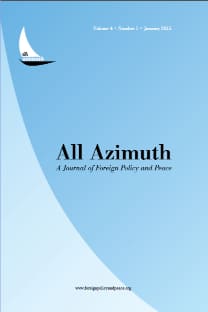Unpacking the Post-Soviet: Political Legacy of the Tartu Semiotic School
This article sketches out general approach to using cultural semiotics as a cognitive tool for analyzing international relations in general and in post-Soviet area in particular. The authors discuss how the homegrown school of cultural semiotics associated with the University of Tartu can be helpful for IR studies. In this respect we place cultural semiotic knowledge in a multidisciplinary perspective and look for projections of its concepts into the vocabulary of foreign policy. Then we intend to discuss the Tartu school from a political perspective, thus claiming that its premium put on cultural issues renders strong politicizing effects. Ultimately, we use cultural semiotic notions and approaches for problematizing the concept of the post-Soviet with its conflictual split between reproducing archaic policies and discourses, on the one hand, and playing by the rules of the post-modern society, with entertainment, hybridity and the spirit of deconstruction as its pivots.
Keywords:
post-Soviet transition, cultural semiotics,
___
- Albert, Mathias. “From Territorial to Functional Space: Germany and the Baltic Sea Area.” Working Paper 39, Copenhagen Peace Research Institute, Copenhagen, Denmark, 2000.
- Arkhangel’skiy, Andrey. “Primirenie so zlodeistvom. Pochemu Patriarkh govorit ob uspekhakh pri Stalinizme.” Slon, November 9, 2015. https://republic.ru/posts/59277.
- Balzacq, Thierry. “The Three Faces of Securitization: Political Agency, Audience and Context.” European Journal of International Relations 11, no. 2 (2005): 171-201.
- Browning, Christopher, and Pertti Joenniemi. “Contending Discourses on Marginality: the Case of Kaliningrad.” Working Paper, Danish Institute for International Studies, Copenhagen, 2003.
- Chernomorsky, Pavel. “V Moskve vosstanovyat memorial’nuyu dosku na dome Brezhneva.” Slon, May 27, 2013. http://slon.ru/fast/russia/v-moskve-vosstanovyat-memorialnuyu-dosku-na-dome-brezhneva-946056.xhtml.
- Ciuta, Felix. “Security and the Problem of Context: A Hermeneutical Critique of Securitization Theory.” Review of International Studies 35 (2009): 301-26.
- Drulak, Petr. “The Problem of Structural Change in Alexander Wendt’s Social Theory of International Politics.” Journal of International Relations and Development 4, no. 4 (2001): 363-79.
- Gazarian, Karen. “SSSR v obiortke ot konfety.” Gazeta.ru, September 12, 2015. http://www.gazeta.ru/comments/2015/09/06_a_7742285.shtm.
- Gottdiener, Mark. Postmodern Semiotics: Material Culture and the Forms of Postmodern Life. Oxford and Cambridge: Blackwell, 1995.
- Gray, Colin. “Inescapable Geography.” The Journal of Strategic Studies 22, no. 2/3 (1999): 161-77.
- Gudkov, Lev. “Derealizatsiya proshlogo: funktsii stalinskogo mifa.” Pro et Contra, November – December 2012. http://carnegieendowment.org/files/ProEtContra_57_108-135.pdf.
- Joenniemi, Pertti, and Marko Lehti. “On the Encounter Between the Nordic and the Northern: Torn Apart but Meeting Again?” Working Paper 36, Copenhagen Peace Research Institute, Copenhagen, Denmark, 2001.
- Joseph, Jonathan. “Hegemony and the Structure-Agency Problem in International Relations: A Scientific Realist Contribution.” Review of International Studies 34, no. 1 (2008): 109-28.
- Kosterina, Irina, and Sergei Ushakin. “My u proshlogo ne uchimsia, my im zhiviom.” Neprikosnovenniy zapas 4, no. 102 (2015): 161-81.
- McDonald, Matt. “Securitization and the Construction of Security.” European Journal of International Relations 14, no. 4 (2008): 563-87.
- Medinsky, Vladimir. “Iz vsekh iskusstv vazhneishim dlia nas yavliaetsa istoriya.” Rossiyskaya Gazeta, August 26, 2015. https://rg.ru/2015/08/26/pravda.html.
- Mlinar, Zdravko, ed. Globalization and Territorial Identities. Brookfreld, Vermont: Avebury, 1992.
- Monticelli, Daniele. Wholeness and Its Remainders: Theoretical Procedures of Totalization and Detotalization in Semiotics, Philosophy and Politics. Tartu: Tartu University Press, 2008.
- Nekrasas, Evaldas. “Is Lithuania a Northern or Central European Country?” Lithuanian Foreign Policy Review 1 (1998): 19-45.
- Nikolaeva, Uliana. “Grozit li Rossii novoe srednevekovie.” Nezavisimaya Gazeta, October 25, 2016. http://www.ng.ru/stsenarii/2016-10-25/9_6843_middleages.html.
- Noth, Winfred. “Crisis of Representation?” Semiotica 143, no. 1/4 (2003): 9-15.
- Parker, Noel. “Integrated Europe and Its ’Margins’: Action and Reaction.” In Margins in European Integration, edited by Noel Parker and Bill Armstrong, 3-27. Basingstoke, Hants: Macmillan Press & St.Martin Press, 2000.
- Pertsev, Andrey. “Nichego smeshnogo. Kak patrioticheskiy renessans stior granitsy parodii i real’nosti.” Slon, February 12, 2015. https://slon.ru/russia/nichego_smeshnogo_kak_patrioticheskiy_renessans_ster_granitsy_parodii_i_realnosti-1214827.xhtml.
- Reus-Smit, Christian. “Reading History through Constructivist Eyes.” Millennium: Journal of International Relations 37, no. 2 (2008): 395-414.
- Robinson, Christopher. Wittgenstein and Political Theory: The View from Somewhere. Edinbourgh, UK: Edinbourgh University Press, 2009.
- Schippers, Birgit, and Judith Butler. “Radical Democracy and Micro-politics.” In The Politics of Radical Democracy, edited by Adrian Little and Moya Lloyd, 73-91. Edinbourgh, UK: Edinburgh University Press, 2009.
- Schmitt, Carl. The Concept of the Political. Chicago & London: The University of Chicago Press, 2007.
- Schonle, Andreas, and Jeremy Shine. “Introduction.” In Lotman and Cultural Studies: Encounters and Extensions, edited by Andreas Schonle and Jeremy Shine, 3-35. Madison: The University of Wisconsin Press, 2006.
- Solomon, Ty. “The Affective Underpinnings of Soft Power.” European Journal of International Relations 20, no. 3 (2014): 720-41.
- Stalvant, Carl-Einar. “The Northern Dimension: A Policy in Need of an Institution?” BaltSeaNet Working Papers 1, Nordeuropa-Institut der Humboldt-Universität, Berlin, 2001.
- Tamm, Marek, and Kalevi Kull. “Toward a Reterritorialization of Cultural Theory: Estonian Theory from Baer and Uexkull to Lotman.” History of the Human Sciences 29, no. 1 (2016): 75-98.
- Toropov, V.N. “Peterburg i ‘Peterburgskiy tekst’ russkoi literatury (vvedenie v temu).” In Mif. Ritual. Simvol. Obraz: Issledovania v oblasti mifopoeticheskogo. Izbrannoe, edited by V.N. Toropv, 259-367. Moscow: “Progress” Publishers, 1995.
- Trudolyubov, Maxim. “Putin: a Soviet Leaders for the 21 Century.” The Moscow Times, March 18, 2015. http://www.themoscowtimes.com/opinion/article/putin-a-soviet-leader-for-the-21st-century/517646.html.
- Wiener, Antje. “Constructivism: The Limits of Bridging Gaps.” Journal of International Relations and Development 6, no. 3 (2003): 252-75.
- Zizek, Slavoi. The Fright for Real Tears: Krzysztof Kieslowski between Theory and Post-Theory. London: BFI Publishing, 2001.
- ISSN: 2146-7757
- Yayın Aralığı: Yılda 2 Sayı
- Başlangıç: 2012
- Yayıncı: Dış Politika ve Barış Araştırmaları Merkezi, İhsan Doğramacı Barış Vakfı
Sayıdaki Diğer Makaleler
Would 100 Global Workshops on Theory Building Make A Difference?
“Sovyet-sonrası”nın Ayrıntılı Bir İncelenmesi: Tartu Semiyotik Ekolün Siyasi Mirası
Andrey MAKARYCHEV, Alexandra YATSYK
Uluslararası İlişkileri Yeniden Şekillendirmek: Afrika’dan Kuramsal Yenilikler
Andrey MAKARYCHEV, Alexandra YATSYK
Ersel Aydınlı, Mustafa Aydın, Emre Baran, Andrey Makarychev, Karen Smith, Ramazan Gözen, Pınar İpek, Deniz Kuru, Haluk Özdemir, Eyüp Ersoy, Siddharth Mallavarapu, Ching-Chang Chen, Seçkin Köstem, Knud Erik Jörgensen, Berk Esen
Kavram Geliştirme ve Yerli Kuramlaştırma: Nüfuz Kavramı Örneği
Is Terrorism Becoming an Effective Strategy to Achieve Political Aims?
